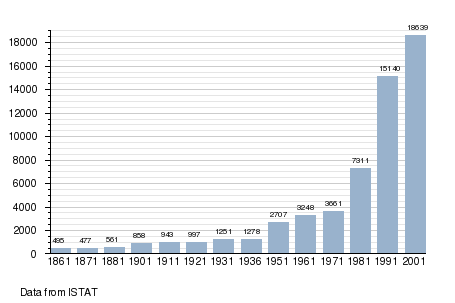Castel Volturno
| Castel Volturno | |
|---|---|
| Comune | |
| Comune di Castel Volturno | |
 | |
.svg.png) | |
 Castel Volturno | |
| Coordinates: 41°3′N 13°55′E / 41.050°N 13.917°ECoordinates: 41°3′N 13°55′E / 41.050°N 13.917°E | |
| Country | Italy |
| Region | Campania |
| Province | Caserta (CE) |
| Frazioni | Bagnara, Baia Verde, Borgo Domizio, Destra Volturno, Ischitella, Scatozza, Seponi, Villaggio Coppola Pinetamare, Villaggio del Sole. |
| Government | |
| • Mayor | Francesco Nuzzo |
| Area | |
| • Total | 72.23 km2 (27.89 sq mi) |
| Population (30 September 2008)[1] | |
| • Total | 23,179 |
| • Density | 320/km2 (830/sq mi) |
| Demonym | Castellani |
| Time zone | CET (UTC+1) |
| • Summer (DST) | CEST (UTC+2) |
| Postal code | 81030 |
| Dialing code | 0823 (communal seat), 081 (Villaggio Coppola Pinetamare) |
| Patron saint | San Castrese |
| Saint day | February 11 |
| Website | Official website |
Castel Volturno is a comune (municipality) in the Province of Caserta in the Italian region Campania, located about 35 km northwest of Naples and about 35 km west of Caserta on the Volturno river.
History
Overview
Castel Volturno was a settlement of the Oscans and then of the Etruscans, who called it Volturnum, and was a trade point on the road to Casilinum and Capua. Volturnum became a Roman colony in 194 BC and, in 95 AD, it was reached by the Via Domitiana, and received a large bridge connecting the two shores of the river with the same name.
The town decayed after the fall of the Western Roman Empire, and, in 806, Duke Grimoald I of Benevento gave its port to the abbots of Montecassino. In 841 it was ravaged by Saracens. After 856, the Lombard bishop Radipert had a castle built on what remained of the bridge. After a period under local counts, in 1062 it was again given to Montecassino while in 1206, Frederick II donated it to the archbishops of Capua.
Alfonso V of Naples gave it to his daughter, but, when her husband, Duke Marino of Sessa, rebelled, besieged it and destroyed part of the walls (1460). The following year the king sold it to the city of Capua, which held it until the abolition of feudalism in the Kingdom of the Two Sicilies in 1810. In 1812 it became an autonomous commune. In 1860 it was annexed to the newly unified Kingdom of Italy.
Castel Volturno received a boost in its agricultural activities after the nearby lands were dried during the Fascist government, and after the new Domiziana Road and a new bridge were built (1954).
Castel Volturno massacre
The Castel Volturno massacre was a massacre perpetrated by the Casalesi clan that led to the deaths of seven people on September 18, 2008. The massacre outside the Ob Ob Exotic Fashion tailor shop on the Via Domitiana was widely characterized as part of a growing conflict between the native Camorra and the immigrant African drug gangs. Murdered were Antonio Celiento, the owner of an arcade next to Baia Verde, and six African immigrants:[2] Samuel Kwaku, 26 (Togo); Alaj Ababa (Togo); Francis Antwi, 31 (Ghana); Eric Affum Yeboah, 25 (Ghana); Alex Geemes, 28 (Liberia) and Cristopher Adams, 28 (Liberia). Joseph Ayimbora (Ghana), 34, survived by feigning death; he later helped identify the killers.
The murders sparked violent protests from Castel Volturno's immigrant community the following day,[3] which culminated in the signing of measures launched by the Ministry of Interior and the Ministry of Defense on combating organized crime and illegal immigration to Caserta. [4]
Main sights
- Castle
- Chapel of San Castrese
- Torre di Patria, a watch tower built in the 15th century
Demographics

See also
References
- ↑ All demographics and other statistics: Italian statistical institute Istat.
- ↑ (Italian)Casalesi, è mattanza: 7 morti. I nomi delle vittime. Minniti e Picierno: servono azioni urgenti contro i clan - casertace, September 18, 2008
- ↑ Strage di camorra, immigrati in rivolta - La Stampa, September 19, 2008
- ↑ Camorra, arrivano 500 soldati. Stretta sull'immigrazione - La Repubblica, February 28, 2009
External links
| Wikimedia Commons has media related to Castel Volturno. |
- (Italian) Castel Volturno official website
- (Italian) Castel Volturno info website